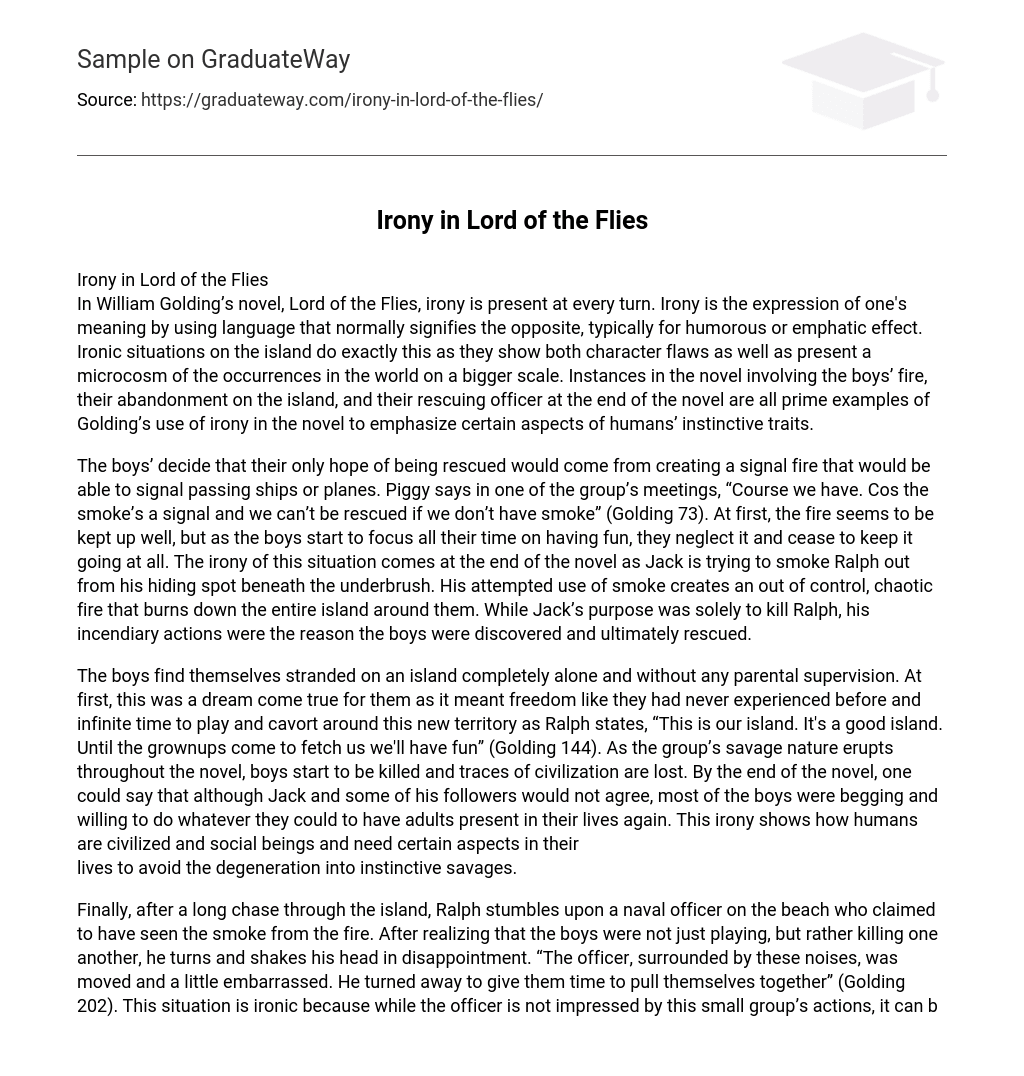In William Golding’s novel, Lord of the Flies, irony is present at every turn. Irony is the expression of one’s meaning by using language that normally signifies the opposite, typically for humorous or emphatic effect. Ironic situations on the island do exactly this as they show both character flaws as well as present a microcosm of the occurrences in the world on a bigger scale. Instances in the novel involving the boys’ fire, their abandonment on the island, and their rescuing officer at the end of the novel are all prime examples of Golding’s use of irony in the novel to emphasize certain aspects of humans’ instinctive traits.
The boys’ decide that their only hope of being rescued would come from creating a signal fire that would be able to signal passing ships or planes. Piggy says in one of the group’s meetings, “Course we have. Cos the smoke’s a signal and we can’t be rescued if we don’t have smoke” (Golding 73).
At first, the fire seems to be kept up well, but as the boys start to focus all their time on having fun, they neglect it and cease to keep it going at all. The irony of this situation comes at the end of the novel as Jack is trying to smoke Ralph out from his hiding spot beneath the underbrush. His attempted use of smoke creates an out of control, chaotic fire that burns down the entire island around them. While Jack’s purpose was solely to kill Ralph, his incendiary actions were the reason the boys were discovered and ultimately rescued.
The boys find themselves stranded on an island completely alone and without any parental supervision. At first, this was a dream come true for them as it meant freedom like they had never experienced before and infinite time to play and cavort around this new territory as Ralph states, “This is our island. It’s a good island. Until the grownups come to fetch us we’ll have fun” (Golding 144).
As the group’s savage nature erupts throughout the novel, boys start to be killed and traces of civilization are lost. By the end of the novel, one could say that although Jack and some of his followers would not agree, most of the boys were begging and willing to do whatever they could to have adults present in their lives again. This irony shows how humans are civilized and social beings and need certain aspects in their lives to avoid the degeneration into instinctive savages.
Finally, after a long chase through the island, Ralph stumbles upon a naval officer on the beach who claimed to have seen the smoke from the fire. After realizing that the boys were not just playing, but rather killing one another, he turns and shakes his head in disappointment. “The officer, surrounded by these noises, was moved and a little embarrassed. He turned away to give them time to pull themselves together” (Golding 202).
This situation is ironic because while the officer is not impressed by this small group’s actions, it can be said that his involvement in the war he is currently fighting in is not condoned. The events on the island are meant to be a microcosm of the big picture of man’s savagery during times of extreme measure.
The signal fire created by Ralph and the group, the joy resulting from the absence of adults, and the disconcerting attitude of the naval officer all reveal the irony that Golding intended to show in this novel. This irony enhances the author’s purpose to display the inherent evil that all men share. This evil can present itself in anybody if the circumstances permit. In Lord of the Flies, William Golding says, “We did everything adults would do. What went wrong?” (Golding ). This quote does an excellent job of showing the overall irony of this entire novel and how this literary technique explains the innate evil that all mankind share.





